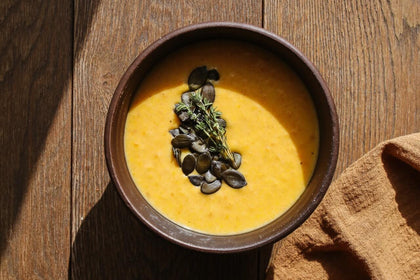Likely, you've heard the phrase "fight or flight," which signifies the sympathetic nervous system's response to stress. The trigger is cortisol — the stress hormone that plays a role in many essential bodily processes and can impact skin, scalp and hair health.
Read on to learn more about foods that reduce cortisol — plus, find out what products you really should be using to reduce stress and boost hair wellness.
Cortisol Causes & Effects
"The “fight or flight” natural stress response is when cortisol is released into the bloodstream and releases glucose to our muscles, making it easy to run away.
"Cortisol production increases heart rate, blood pressure and allows us to quickly move and react," said Sarah Koszyk, MA, RDN, registered dietitian nutritionist and co-founder of MIJA. "Fast forward to the present, and many of the things that cause a stressful situation don’t necessarily require that physical 'fight or flight' response. What happens is cortisol levels increase, keeping our blood pressure, heart rate and glucose levels elevated as we sit there and stress out. That’s where we run into problems."
Prolonged stress creates too much cortisol, which can act as the catalyst to a host of potential problems, including:
- An increase in blood sugar levels can result in rapid weight gain and increased belly fat, as unused glucose is stored as fat.
- High blood pressure (hypertension) and insulin resistance
- Activated adrenal glands and adrenal gland fatigue
- Digestive problems, including diarrhea, bloating, cramping and/or upset stomachs.
- Sleep deprivation or interrupted sleep cycles
- Impaired cognitive function or interference with proper brain function
- Skin, scalp and hair issues
#include-related-slider#
How Cortisol Can Hurt Your Scalp & Hair Health
Simply put, stress is taxing on the body. Mental stress manifests itself physically, potentially impacting hair growth cycles or irritation of the skin and scalp. Elevated cortisol levels also lead to the breakdown of collagen and elastin. This can cause the loss of small blood vessels that supply nutrients and oxygen to the skin of the scalp, which may impair hair follicles and growth.
"As cortisol pertains to the system that includes the hair, skin and scalp, it can also negatively affect cell signals and increase oxidative stress, which can disrupt our natural hair growth cycle," said Dr. Michael T. Murray, N.D., iHerb chief scientific advisor and author. "People who are highly stressed can lose hair, and because of this, hair might not grow back as efficiently. This can lead to balding or thinned areas on the scalp."
Minimize Stress for Healthier Hair, Skin & Scalp
Stress also stimulates the pituitary gland, which in turn can trigger cortisol release. This may result in a less-than-ideal reaction on the skin, scalp or even have the potential to result in more serious conditions, like dandruff or seborrheic dermatitis.
"Increased oil production on the scalp and face can worsen acne and seborrheic dermatitis (dandruff)," said Sheilagh Maguiness, MD and co-founder of Stryke Club. "Stress exerts its impact on our skin through the HPA (hypothalamic-pituitary-axis), where stress signals lead to increased levels of cortisol in our bodies. Our skin has receptors for cortisol and related hormones, so chronically elevated serum cortisol levels markedly impact our skin. It’s a good idea to manage stress in our lives. A healthy diet, adequate sleep, moderate exercise and mindfulness can all be helpful to our brain–skin connection."
If stress is impacting the fullness of your hair, it might be time to add a serum to your routine.
Experience the benefits of GRO+ Advanced Hair Serum. It's powered with vegan phyto-actives, which helps to soothe stressed out strands and support thicker, fuller looking hair. Here's what you can expect from this advanced serum:
- Lightweight and non-greasy
- Vegan and cruelty-free formula
- Strengthens roots and visibly increases hair density, thickness and volume
- Visible results in as soon as 90 days of consistent use, with peak results around four months
12 Foods to Lower Cortisol Levels
To reduce cortisol levels naturally, start with your diet. Eat a balanced, nutrient-dense meal plan that nourishes your body, choosing foods that lower cortisol levels. If you aren't able to get all these foods in your diet, supplemetns are a great way to ensure you're getting the vitamins and minerals you need to support a healthy lifestyle. A nutritional supplement is a great way to get an extra daily dose of essential minerals and vitamins while bolstering your scalp and hair.
“When chronic stress levels are extreme and prolonged from major life events, your body will start to preserve energy and shut down tasks that aren’t crucial for survival, such as your menstrual cycle and hair growth,” said Koszyk. "You’ll want foods high in magnesium to lower cortisol levels. Also, foods high in B12 help your body metabolize high cortisol levels. Protein-rich foods help balance sugar levels while foods rich in Omega-3 fatty acids reduce inflammation."
Make the most of your meals by adding these foods that reduce cortisol:
1. Avocados
Avocados are rife with magnesium, potassium, B vitamins and vitamin K. Also, they pack a punch of heart-healthy monounsaturated fat.
2. Bananas
Bananas include magnesium, potassium, soluble fiber to help lower inflammation — plus vitamins A, B-6 and C.
3. Broccoli
Broccoli includes a healthy dose of magnesium, which helps lower cortisol, and calcium, iron, potassium, zinc, vitamin C.
4. Dark Chocolate
Dark chocolate contains fiber, iron, and magnesium, which helps lower cortisol — plus zinc and copper.
5. Seeds
Pumpkin seeds, chia seeds, flax seeds or ground flax meal all include Omega-3 fatty acids and help to support blood sugar control, which can help reduce cortisol levels.
6. Spinach
Spinach is high in magnesium, as well as potassium, folate, fiber, iron, vitamin A, vitamin C and vitamin K.
7. Nutritional yeast
Nutritional yeast is protein-rich and also includes high amounts of B12 to help metabolize how cortisol interacts within the gut.
8. Probiotics
Probiotics found in fermented foods, like kimchi, miso and sauerkraut, are great for gut health, maintaining balance in hormones and keeping the immune system strong.
Supercharge a smoothie or bolster any drink with supplement powder, including vitamins, minerals, probiotics, adaptogens, 50 million CFU probiotics and pro-inflammatory cytokines, which support healthy keratin and collagen production. The powder supports a healthy gut microbiome and circulation and helps encourage visibly thicker, fuller, longer-looking hair.
9. Olive Oil
Olive oil has Omega-3 to reduce inflammation caused by stress.
10. Nuts
Walnuts and almonds can help balance blood sugar and cortisol levels.
11. Adaptogens
Adaptogens such as mushrooms, moringa and ashwagandha can help with reducing high cortisol levels, as well as minimize damage from free radicals.
12. Cinnamon
Cinnamon helps to support blood sugar, aiding in regulating cortisol levels.
Read: How Stress Impacts Hair Loss
What Foods You Should Skip
Cortisol has a pro-inflammatory effect on cells, meaning it increases inflammation. So it's best to avoid inflammatory-inducing foods such as refined sugar, alcohol, refined grains, trans fats and high levels of saturated fat, which can all contribute to an elevation of cortisol.
"Sugar intake is one of the primary culprits that can negatively affect cortisol levels, as cortisol releases glucose into the body and sugar brings in extra glucose," said Koszyk. "Higher blood sugars spike cortisol levels, too, so reaching for that cookie isn’t the best solution when people are feeling super stressed out. Instead, opt for a green tea or matcha-based drink, which has L-theanine and is a slow-releasing caffeine that promotes calmness. Stevia can cause gastrointestinal upset, which is likely to add additional stress to your day."
Instead, Koszyk advised to opt for low glycemic sweeteners such as:
- 100% maple syrup
- Coconut sugar
- Monk fruit sweetener
Read: 9 Natural Ways to Lower Cortisol
Set Healthy Sleep & Lifestyle Habits
"Magnesium-rich foods such as avocados, broccoli, pumpkin seeds and spinach help lower cortisol levels affecting the way in which our brains process stress levels," said Koszyk. "Since magnesium also helps with sleep, people can feel calmer after eating foods high in magnesium. And, getting enough sleep is associated with lower cortisol levels."
Boost better sleep habits by including mindfulness-based stress reduction rituals into your daily routine. Integrate daily relaxation techniques such as:
- Practicing meditation
- Doing moderate exercise or other daily movement to help enhance serotonin production.
- Stretching to ease muscle tension
- Practicing a restorative yoga sequence for sleep
- Being conscious and aware of what you're eating and drinking.
- Taking a holistic approach to your personal care products that are going on and into your body.
- Acting with mindfulness in self-care rituals that nourish your mind, spirit, body, skin and hair.
Make your next meal more mindful. How you nourish your body can make all the difference in emotional and physical well-being, including that of your scalp and hair!
More From VEGAMOUR
- Shop: Bre Dodd Smith's Top VEGAMOUR Picks
- Yoga for Hair Growth: 8 Stress-Reducing Poses
- 4 Foods to Eat to Delay Gray Hair, According to a Nutritionist
- The Lowdown on Inflammation (and How That Affects Your Hair)
Photo credit: Polina Tankilevitch/Pexels
Back



















